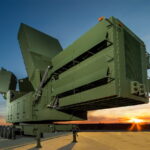
The Navy’s new chief information officer said Wednesday the department must hold its middle-tier industry partners to more stringent supply chain security standards, as he looks to improve the service’s lagging cyber posture. Aaron Weis, who has served in the new role for six weeks, told attendees at an AFCEA event the department has to better protect its information and cited the Pentagon’s planned rollout of the Cybersecurity Maturity Model Certification (CMMC) contracting standards as a key step to ensuring…

 By
By 











